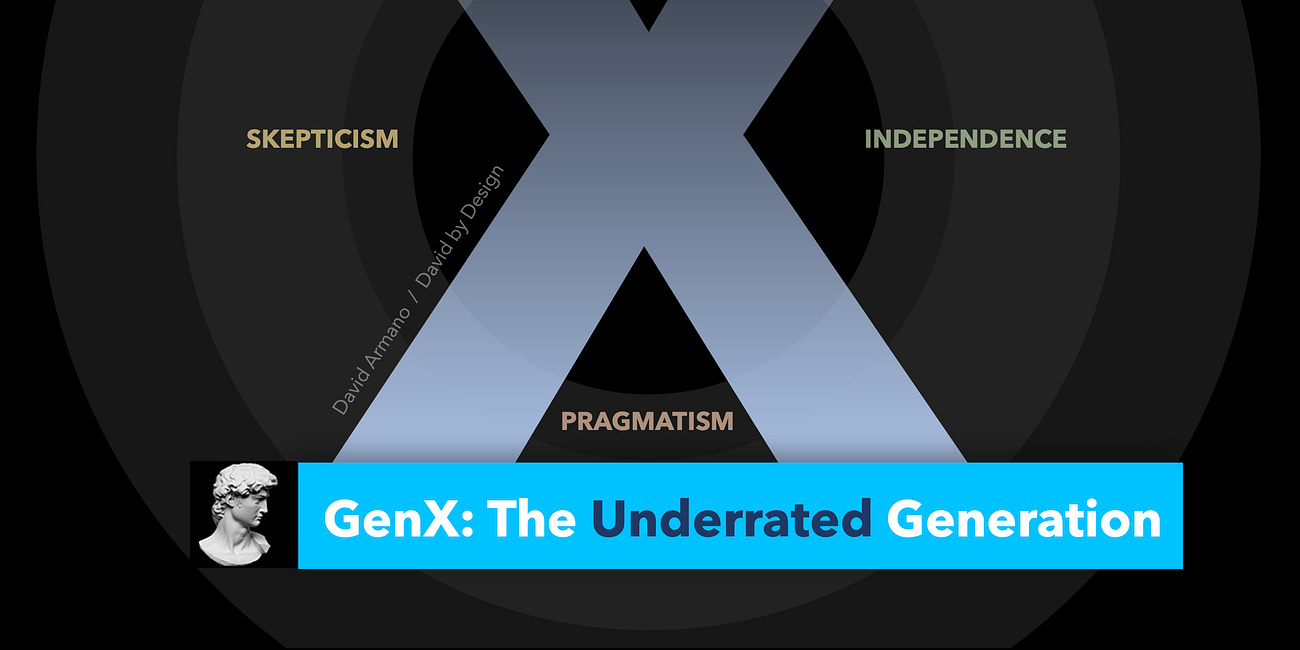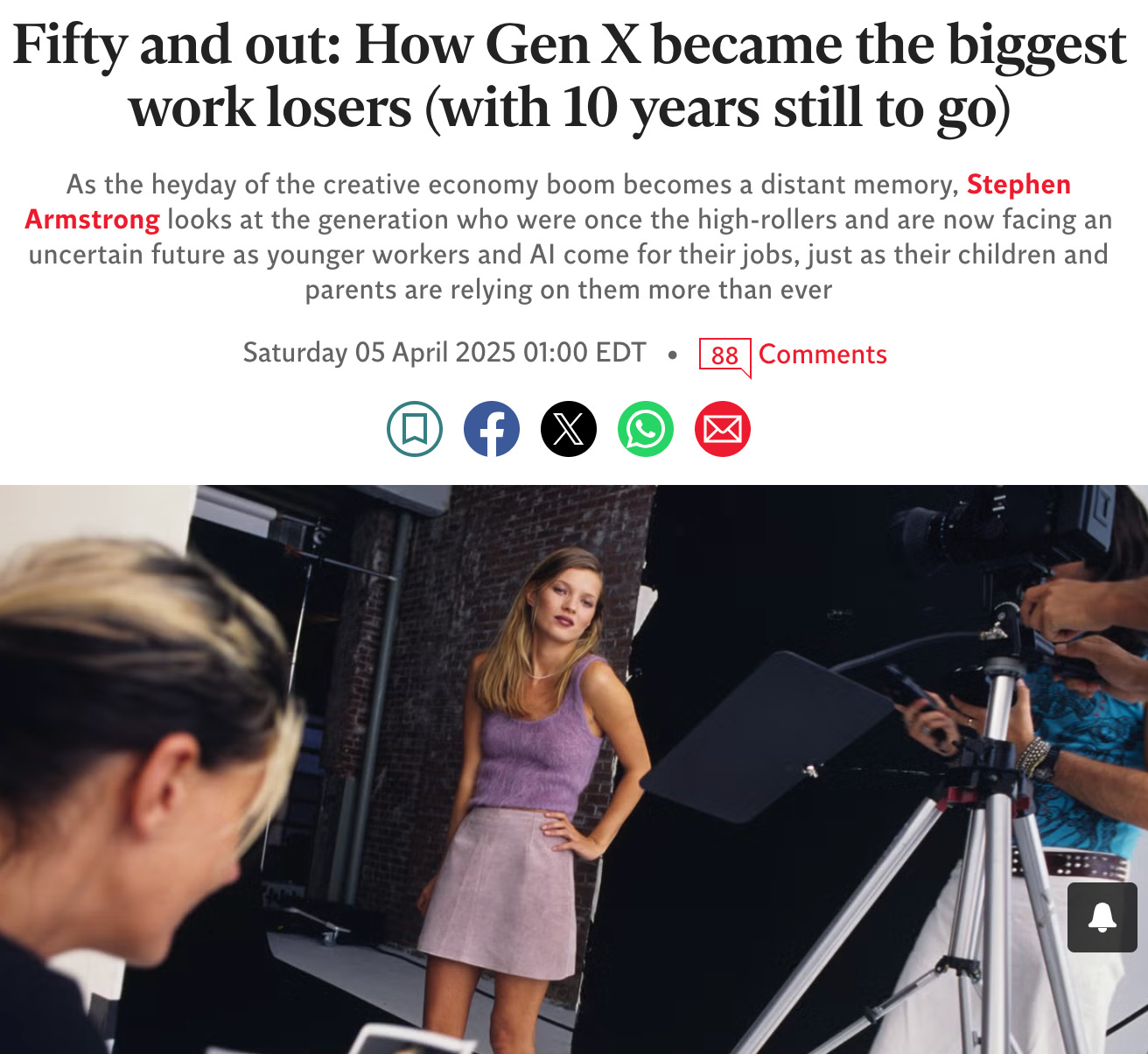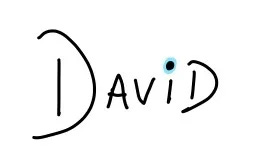If Generation X were a superhero, we’d be Susan Storm from the Fantastic Four. Think about it…
First, there is the obvious—one of Sue’s signature powers is the ability to turn invisible—something that Gen X has both felt, lived, and embraced for decades… living between the significantly larger generations of baby boomers and millennials. But the parallels don’t stop there. Sue also possessed the power of protection in the form of creating forcefield-like “shields,” which often saved the day for both herself and her super teammates. This is a superpower I frequently see with my GenX peers, as we offer up ourselves as human shields for both our aging parents and the children we’re raising. Or, through the professional colleagues we’re managing or mentoring. As I’ve spoken about before: We’re a feral generation, but we also know the power and value of having someone’s back...
GenX: Underrated And Underplayed
As a music lover, I often find myself using the same descriptors when it comes to music and bands that I hold in high regard:
Sue’s powers are pretty incredible if you think about it, and she’s inherently different from the rest of the team as she’s a woman. She doesn’t have the brute strength of The Thing, she doesn’t enjoy the academic peer recognition or leadership status as Dr. Richard Reed, nor does she attract attention like the Human Torch, who can both fly and is literally on fire. That’s a superpower that begs for the spotlight.
No, Sue Storm—as incredible as her powers are, can be understandably overlooked. After all, she is the invisible woman.
So, Gen Xers get Sue—we know what it’s like to be invisible. But recently, we’re being “seen” though not for entirely enviable reasons. A viral article in the New York Times titled “The Gen X Career Meltdown” paints a picture of Gen Xers lives and careers transitioning from certainty and once high-flying (and often creative careers) to lives of professional uncertainty, stress, and in many cases being unprepared for it all. But the NY Times hasn’t been the only publication to “see” us Gen Xers: a recent article in The Independent also took a close look at the state of Gen X, viewing it with a similar lens and embellishing with the clickbaity headline:
Of both articles, it is this excerpt from The Independent that keeps playing back in my Gen X slacker brain:
It’s no surprise that Generation X – aged between 45 and 59 – are the least satisfied age group at work, with 16 per cent believing they do not have a “good” job, according to hiring platform Indeed. Not only are their “talents” often no longer needed in a world where AI is fast replacing copywriters, photographers, and designers, but those still in place often experience age discrimination (around 80 per cent, according to a 2022 AARP survey).
It’s the age discrimination part specifically. I was chatting with a much younger work colleague recently, and I shared with him that when he once said I had “young energy,” I found it to be a huge compliment. In an earnest and well-intending way, he elaborated on why he thought that:
”So many people have old energy.”
I appreciated his candor, but I couldn't help thinking about my GenXer peer set. While I am grateful to be perceived as “youthful,” how many of my Gen X peers have lost opportunities simply because of their biological age, something none of us can control? Speaking of peers, one of my fellow Gen Xers and former colleagues from years back posted the following as part of commentary related to the above NYT article:
…old colleagues and friends who once had high-flying, lucrative careers that were disrupted by tech shifts, personal circumstances, or just didn’t adapt well or fast enough...
I felt this sentiment was leaving out some critical context. While it’s true—disruption comes for industry and often it is the ones who are unable to adapt, which become roadkill—but there is also the inconvenient truth that in corporate America—many of us have limited shelf lives and often, that shelf life begins to expire the moment our forties are behind us. My response offered up this unfortunate perspective:
You worked in marketing, so you know firsthand that this is a field where “aging out” is common. We have to be more honest about this part. I often find myself sharing the stories of my three uncles. Two of them worked at banks and were forced into “early” retirement at 55. They did great, though, having bought homes when they were much less expensive, and college was also affordable for their children. They did some investing and part-time consulting until retirement. My third uncle managed to hold on past 60. I remember hearing his stories of fighting the powers trying to push him out. But one can only fight so long. He got cancer and never made it to retirement. Gen Xers are in life’s classic challenging phase, during a time when it’s never been more expensive to live. We’ll figure it out, but it’s not going to be easy.
Now let’s replay the story of my uncles during the AI Age. On the bright side, AI is likely to play a role in advancing diagnosis and even possible cures for certain types of cancer. On the less bright side, it will also accelerate “aging out” trends, as it will certainly decrease the amount of human capital needed for entry-level knowledge work. Millennials and GenZ would be wise to take note.
But back to Sue Storm—the Invisible Woman, and realistically, an anchor for her teammates. Sue plays a role in which she helps keep her hot-headed younger brother in check, remains a close friend to the strongest member of the group, and assumes the role of a capable leader when it is believed that the established leader, Reed Richards, is dead. In other words, when the chips are down, Sue Storm becomes very visible, for all the right reasons.
Visually yours,






Hey David,
I think you and I spoke when I first left the agency world, right after you left Edelman. That was when I took the plunge and left what had been considered a stable gig for the world of start‑ups. It’s been about six years, and it has been anything but easy.
The hardest part—something I could never have predicted—was shedding the image of who I was and the mental models I used to approach work. I was no longer in the director’s seat, orchestrating within a system with well‑defined rules. I learned very quickly, as I descended into startup land, that my mental model for solving early‑stage problems was off by orders of magnitude. Swallowing that pill was tough: my ego was still back in the orchestration of launching vehicles around the globe, while reality was screaming, “We need product‑market fit, and you have to get us there alone because we’re not capitalized for a team.”
That was my crossing of the chasm, so to speak. I had to strip every initiative down to its irreducible core and rebuild it around the resources I actually had—my own time, skills, and readily available tools—instead of the team I wished I had.
In hindsight, it was the best decision of my life because it forced me to ask, “What can I accomplish without anyone else?” In the process, I returned to my roots of design and prototyping, pushing myself to build repeatable tools at every turn. It sounds cliché, but embracing the 10× mindset started the day I realized I had a choice: slog through the trough of despair and emerge an entrepreneur, or retreat to the comfort zone I once knew.
To my fellow Gen Xers—whether you’re being pushed down this path or can already see the new world taking shape—don’t fear change. Accept that it will be hard for a while, but remember: we’ve never before witnessed such a complete rewriting of the rules in our careers. The only real limit now is our imagination.
This is spot on. I often discuss the invisible nature of Gen-X with my two sisters (all three are more senior Gen-X, our brother is "boomer.") I lead a small team, and half the team is older, there are two millennials, and I am on the cusp of hiring my first Gen-Z. It is interesting to see the differences in outlook and expectations across the range. Gen-X is the true "middle child" of the group. Often times invisible, under-rated, but should never be under-estimated.